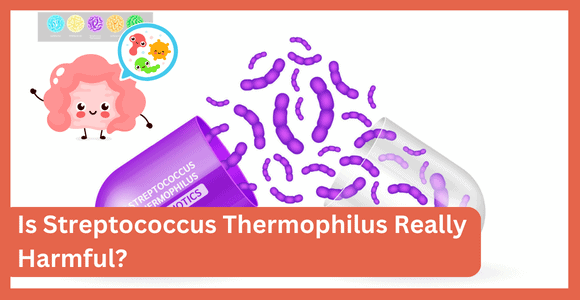Are you concerned about the potential consequences of consuming Streptococcus thermophilus, a bacteria commonly found in dairy products? While most regard it as harmless, others hesitate.
Is streptococcus thermophilus harmful? This article will address all that and more by providing clear evidence-based insight into its impacts on human health. Allow us to arm you with the knowledge needed to make informed decisions concerning your diet.
A deficiency of Streptococcus thermophilus in the gut microbiome is not typically recognized as a specific health concern, as this bacteria is not considered an essential part of the human microbiome. Additionally, it could also disrupt lactose fermentation within the gut and lead to further gastrointestinal issues.
Therefore, although it’s usually deemed as nonessential — if you experience any symptoms related to its absence —it might be important to consider replenishing your supply.
Table of Contents
What is It? Where is Streptococcus Thermophilus Found Naturally?
Streptococcus thermophilus is an essential bacterial strain utilized in the production of yogurts and cheeses, oftentimes discovered naturally in dairy products. Here are some key points about its natural habitat:
 It is a bacteria that loves heat and grows remarkably in temperatures ranging from 40-45°C (104-113°F). It’s an incredibly resilient species capable of thriving even in the most extreme conditions.
It is a bacteria that loves heat and grows remarkably in temperatures ranging from 40-45°C (104-113°F). It’s an incredibly resilient species capable of thriving even in the most extreme conditions.- Beneficial for digestion, lactase is naturally present in the intestines of animals such as cows, goats, and sheep. This enzyme assists with breaking down milk’s lactose content.
- It can be discovered in various dairy products that have undergone fermentation, including yogurt, cheese, and kefir.
- Apart from dairy products, Streptococcus thermophilus has also been retrieved from other sources such as sewage and wild animals’ excrement.
- It is an essential and omnipresent bacteria, that plays a pivotal part in the production of dairy products.
Moreover, it can be found not only in various environmental settings but also inside the gastrointestinal tract of ruminants as well as fermented dairy goods.
Benefits & Side Effects. How Does Streptococcus Thermophilus Affect Humans?
Streptococcus thermophilus, a bacteria found commonly in dairy products, is generally thought to be safe for consumption; however, it comes with its own advantages and disadvantages that should be taken into account. Here are some key points:
Benefits:
- Streptococcus thermophilus provides numerous digestive benefits, primarily through breaking down lactose sugar found in milk. This probiotic bacteria can help improve digestion for a healthier and more balanced body.
- Additionally, it can help to heighten the immune system by sparking antibody production and diminishing gut inflammation.
- Research has revealed that consuming products containing Streptococcus thermophilus can provide relief from lactose intolerance symptoms and reduce the probability of colon cancer.
- Studies suggest that it may be able to reduce cholesterol levels, though further research is necessary for confirmation.
Side Effects:
- Though Streptococcus thermophilus is usually harmless, people with underlying medical issues or an impaired immune system may be at higher risk of contracting the infection.
- In extreme circumstances, it has even been linked to lethal infections like endocarditis – a life-threatening infection of the heart.
- Products that contain Streptococcus thermophilus can occasionally bring about minor digestive discomforts, such as bloating or gas.
To wrap it up, Streptococcus thermophilus is a beneficial bacteria found in dairy products that could potentially support digestive and immune health. Although it may be dangerous for some people and bring about mild digestion issues on occasion, speaking with a medical professional first is essential before taking any probiotic supplement.
Streptococcus Thermophilus vs Strep Throat
Interesting facts that Streptococcus thermophilus was first isolated in the early 20th century from a sample of sour milk, and has since become an important bacteria in the food industry.
Although Streptococcus thermophilus and strep throat share a comparable appellation, they are two unrelated organisms. Here are some key points that differentiate the two:
Streptococcus thermophilus:
 Streptococcus thermophilus is an invaluable bacterium that plays a critical role in the production of dairy products such as yogurt and cheese.
Streptococcus thermophilus is an invaluable bacterium that plays a critical role in the production of dairy products such as yogurt and cheese.- These thermophilic bacteria are specially designed to thrive in temperatures much higher than the human body, such as those found within a cow’s stomach or during dairy production.
- This bacteria is ordinarily viewed as harmless and is frequently included in food items as a probiotic with the function to help with digestion.
- It has also been studied for its potential health benefits, including reducing the risk of colon cancer and lowering cholesterol levels.
Strep Throat:
- The notorious Streptococcus pyogenes, more commonly termed ‘group A streptococcus’, is the culprit of a frequent infection called strep throat.
- Pharyngitis usually manifests as a sore throat with painful swallowing, fever, and swollen lymph nodes in the neck area.
- Most frequently, the transmission of this virus takes place through direct contact with another person’s saliva or nasal secretions.
- Antibiotics are the go-to remedy for treating strep throat in order to forestall any possible complications, including but not limited to rheumatic fever or kidney damage.
- Unchecked, strep throat can lead to further dangerous infections including sinusitis, earaches, and tonsillitis.
To sum up, Streptococcus thermophilus is a safe bacteria that are often found in dairy items and could bring health benefits. In comparison, strep throat is a bacterial infection that needs to be promptly treated so as to prevent more serious consequences.
The key difference between the two is that one is a harmless bacteria used in food production, while the other is a pathogenic bacteria that can cause illness and requires medical attention.
Frequently Asked Questions
Does Streptococcus Thermophilus Produce Toxins?
It is highly unlikely that thermophilus IDCC 2201 will generate any hazardous chemicals during the fermentation process.
Why is Streptococcus Thermophilus in Yogurt?
Thermophilus is one of the most proficient bacteria when it comes to converting lactose into lactic acid, a compound crucial for coagulating milk proteins. This bacterium not only produces an amazing flavor but provides desirable properties such as increased viscosity and water-holding capacity (Sun et al., 2011). Thus, thermophilus is essential in creating any delicious yogurt.
Is Streptococcus Thermophilus Pathogenic?
The non-harmful, Gram-positive microorganism Streptococcus thermophilus (STH) is a part of the phylum Firmicutes and family Streptococcaceae. It is also classified in the salivarius group with two other species: Streptococcus salivarius and Streptococcus vestibularis.
Conclusion. So, Is Streptococcus Thermophilus Good or Bad?
From a scientific standpoint, it is commonly thought to be advantageous. It is classified as a probiotic; this means that it can help maintain the human gut microbiome’s healthiness.

Additionally, studies have unveiled numerous potential benefits of using S. thermophilus – such as aiding digestion and improving immunity while decreasing inflammation – making its use rather beneficial!
Despite its beneficial properties, Streptococcus thermophilus can have some minor downsides.
Rarely, it may lead to infections in people with compromised immune systems; however, these cases are an exception rather than the rule as most individuals will experience no ill effects from consuming this bacteria.
Overall, it is an immensely advantageous bacteria that helps manufacture dairy products and could potentially provide health advantages.
Nevertheless, like any other food or dietary supplement, it should be consumed moderately; if you have worries or medical conditions, consulting with a healthcare specialist would be beneficial for your safety.

 It is a bacteria that loves heat and grows remarkably in temperatures ranging from 40-45°C (104-113°F). It’s an incredibly resilient species capable of thriving even in the most extreme conditions.
It is a bacteria that loves heat and grows remarkably in temperatures ranging from 40-45°C (104-113°F). It’s an incredibly resilient species capable of thriving even in the most extreme conditions. Streptococcus thermophilus is an invaluable bacterium that plays a critical role in the production of dairy products such as yogurt and cheese.
Streptococcus thermophilus is an invaluable bacterium that plays a critical role in the production of dairy products such as yogurt and cheese.